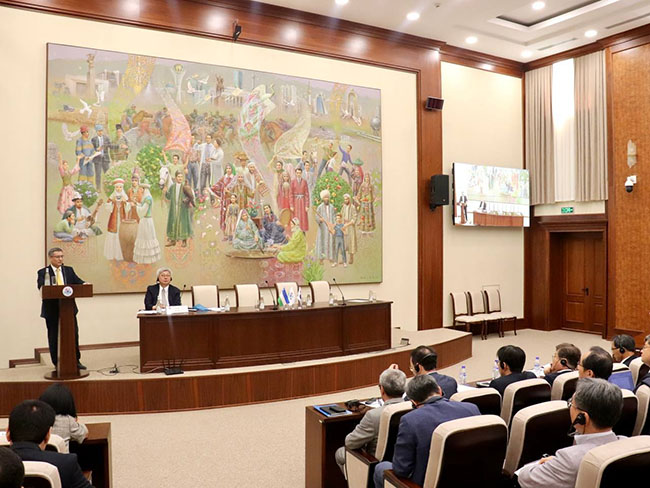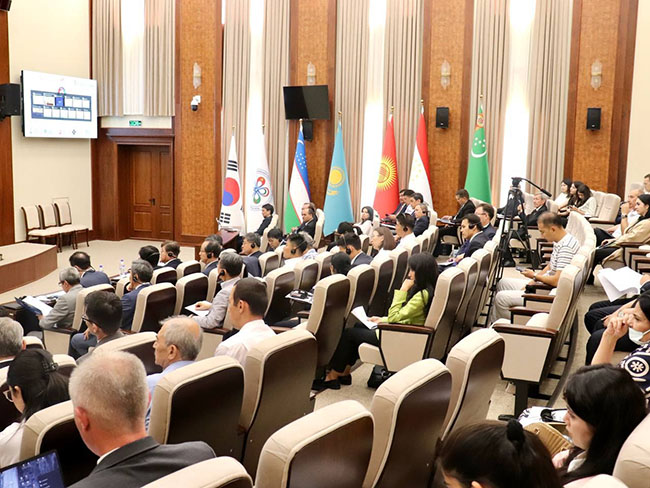No. 45 (489) July 2024
THE FIRST FORUM OF ANALYTICAL CENTERS OF CENTRAL ASIA AND THE REPUBLIC OF KOREA
On July 30, the International Institute for Central Asia hosted the first expert forum entitled “An Era of Change: Envisioning Future Cooperation between Central Asia and the Republic of Korea”.
The event was co-organized by the International Institute for Central Asia and the Secretariat of the Republic of Korea-Central Asia Cooperation Forum. The Forum was attended by about 100 representatives of ministries and agencies, diplomatic missions, leading analytical and research centers of Central Asian countries and the Republic of Korea.
The Director of the International Institute for Central Asia, J. Vakhabov emphasized in his welcoming speech that in order to further strengthen the effectiveness of cooperation between the Central Asian region and the Republic of Korea, it is important to develop new approaches to multilateral cooperation, especially in the light of preparation for the first Central Asia-South Korea Summit in 2025 and the promotion of the K-Silk Road initiative. In this context, Mr. Vakhabov noted that there was a growing need in strengthening expert exchanges and practical interactions between the countries of the region and South Korea, and, accordingly, in revising traditional approaches on priority areas of cooperation.

The forum was consisted of the following sessions:
- Mutually beneficial partnership between Central Asia and the Republic of Korea 2.0 for a new geopolitical dynamic: envisioning future and key priorities.
- Reconstruction of the global value chain and economic security: mutually beneficial cooperation on energy and essential minerals сотрудничество в сфере энергетики и важнейших полезных ископаемых
- Addressing climate change: Promising strategies for water security and sustainable water management.
- Strategic collaboration in the era of technological hegemony: Collaborative approaches to ICT and education in the field of Artificial Intelligence.

The following speakers presented their reports at Session 3 “Addressing climate change: Promising strategies for water security and sustainable water management”.
Jong Ho Ahn, General Director of the Water Resources Research Group at the Korea Environment Institute, gave an overview on the legal, institutional and technical framework for water resources management in Korea. The emphasis was placed on the implementation of smart water systems and systems of early warning in case of extreme water-related events such as droughts and floods.
Dinara Ziganshina, Director of SIC ICWC, made a report on “Climate and Water Resources in Central Asia”. She outlined existing and future challenges of water resources management in the Aral Sea basin shared by Afghanistan, Kazakhstan, Kyrgyzstan, Tajikistan, Turkmenistan, Uzbekistan. These include increasing water demand due to population and economic growth and impacts of climate change. Actions taken by the countries to address these challenges at the global and regional levels were presented. At the regional level, the International Fund for Saving the Aral Sea and the Interstate Commission for Water Coordination of Central Asia provide a multilateral platform for Central Asian countries to work together on transboundary water issues and adaptation to climate change. Research and development activities play a special role in this work, enabling countries to find science-based solutions for effective adaptation to climate change. Cooperation with partners from the Republic of Korea takes place bilaterally and within the framework of organizations like the World Water Council and the Asian Water Council.
Azamat Omurkulov, researcher of the National Institute for Strategic Initiatives under the President of the Kyrgyz Republic, drew the audience's attention to the country's needs in terms of monitoring glacier melting, response to water-related disasters, and development of hydropower potential. The reporter noted the importance of considering environmental and economic aspects of water use and called for transboundary cooperation and partnership with the Republic of Korea on current issues relevant to this mountainous country.
Vadim Sokolov, Head of the Agency for Implementation of IFAS Projects in Uzbekistan, made a report “On assessments of climate change intensity and assessments of the path of Central Asian countriestowards water security’. Mr. Sokolov presented the author's methodology for assessing the intensity of climate change, including quantification of these changes for the regions of Uzbekistan, as well as the water security outlook of Central Asian countries in 2013-2020 according to the methodology of the Asian Development Bank.
Ilkhom Djuraev, Director of the Center for Water Sector Reforms under the Ministry of Water Management of the Republic of Uzbekistan, talked on measures implemented by the Republic of Uzbekistan to respond to the negative impacts of climate change in order to achieve water security and address water management issues in Central Asia. In particular, he noted the reforms aimed to improve water management system, efficient water use, modernization and development of water management facilities.
Orazmukhamet Annabaev, Chief researcher of the Centre for Strategic Studies at the Institute of International Relations of the Ministry of Foreign Affairs of Turkmenistan, outlined the country's priorities regarding the transboundary water sharing based on the norms of international water law, the interests of all countries in the basin and with involvement of international organizations. He also noted the importance of measures taken at the national level to improve the efficiency of water use, grow drought-resistant crops and adapt to climate change.
Timur Sabitov, Head of the Project Management Department at the Ministry of Ecology, Environmental Protection and Climate Change of the Republic of Uzbekistan, spoke about institutional transformations in the system of state environmental management, the establishment of the Central Asian Green University, and plans to create a Climate Expo Centre in the Aral Sea region.
Key conclusions and recommendations of the session on future cooperation are as follows:
- Importance of strengthening scientific cooperation between the Central Asian countries and researchers from Korea in the area of response to climate change affecting water resources, water uses (irrigated agriculture, energy, urban water supply) and ecosystems now and in the future.
- Intensify cooperation to attract green and climate funds to address climate change adaptation and water management measures and to ensure effective use of attracted financial resources.
- Building long-term flow forecasts based on the assessment of the impact of climate change on glaciers, as well as regular water security assessments at country and administrative territory level.
- Digitalization and ICT application to improve the quality and accuracy of water accounting in terms of water formation and use.
- Wider adoption of water-saving technologies and improvement of water use efficiency to meet growing water demand in the face of population growth, economic development and the impacts of climate change. Pay due attention to environmental issues both in upper and lower river reaches and in environmental disaster zones.
- Building technological and human capacities in the water sector, including through joint research and training. Moving from chaotic, occasional training to systemic and harmonized training and capacity building programs.
- Experience sharing in implementing public-private partnership mechanisms and improved urban water supply.
- Building continuous water dialogue through water diplomacy tools and generally accepted international water law norms.
- Promoting a new culture of relations based on moral values and responsible consumption.